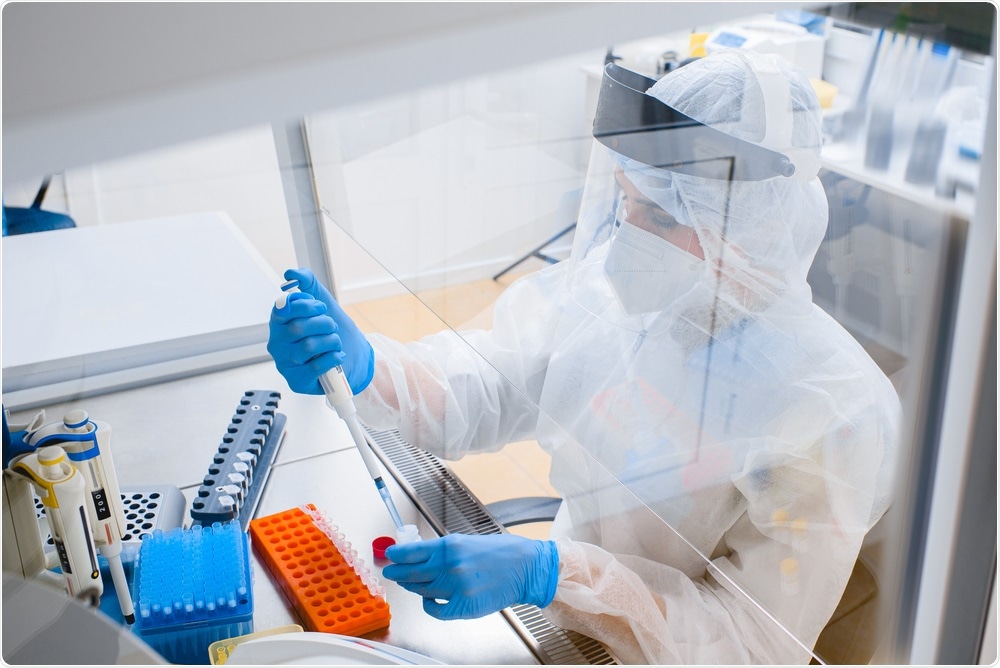Several coronavirus disease 2019 (COVID-19) vaccines have been developed over the course of the current pandemic. Since receiving emergency use authorization from several countries around the world, vaccine rollout has commenced and allowed for over 2.12 billion people worldwide to be fully vaccinated against COVID-19 as of August 31, 2019.
 Study: Emergence of Multiple SARS-CoV-2 Antibody Escape Variants in an Immunocompromised Host Undergoing Convalescent Plasma Treatment. Image Credit: Salov Evigeniy / Shutterstock.com
Study: Emergence of Multiple SARS-CoV-2 Antibody Escape Variants in an Immunocompromised Host Undergoing Convalescent Plasma Treatment. Image Credit: Salov Evigeniy / Shutterstock.com
The emergence of SARS-CoV-2 variants
Several SARS-CoV-2 variants have been classified as Variants of Concern (VoC) and Variants of Interest (VoI). Scientists have identified four VoC, of which include the B.1.1.7 (Alpha), B.1.351 (Beta), P1 (Gamma), and B.1.617.2 (Delta) variants. These variants were first reported in the UK, South Africa, Brazil, and India, respectively.
All VoCs carry the N501Y mutation in the spike (S) protein and are more virulent with transmissible. Additionally, this mutation has also increased the affinity of SARS-CoV-2 to the angiotensin-converting enzyme 2 (ACE2) receptor of the host.
In both the types of VOCs and VOIs, the S protein contains clustered mutations in the N-terminal domain (NTD) and the receptor-binding domain (RBD) regions. Scientists observed that in some of the VoCs, these mutations cause a reduction in the susceptibility to convalescent-phase serum, commercial monoclonal antibody cocktails, and vaccine neutralization. Additionally, these variants have also been associated with increased rates of reinfection.
Immunocompromised hosts and SARS-CoV-2 variants
Scientists believe that the accumulation of these mutations is a consequence of intra-host viral evolution, especially in immunocompromised hosts, where COVID-19 infection remains for a prolonged period. A recent study revealed that antibody escape mutations occurred in an immunocompromised patient 75 days after infection.
A new study published in the journal mBio discusses the microevolution of SARS-CoV-2. In this study, researchers have isolated the virus from sequential tracheal aspirates from an immunosuppressed patient who was treated with tacrolimus, steroids, and convalescent plasma therapy. In the recovered viruses, scientists successfully identified multiple mutations in the NTD and RBD regions that are correlated with reduced antibody neutralization within 3 weeks post-infection.
It is quite likely that cytotoxic T-cells and antibody-mediated immune responses are essential for removing the viral infection. In the current study, the immunocompromised individual’s antirejection regimen of mycophenolate and tacrolimus targeted and inhibited T-cell function and replication.
Subsequently, the patient was not administered any further mycophenolate; however, tacrolimus and prednisone were continued during the patient’s entire hospital stay. This could have led to the impairment in his cellular immunity against SARS-CoV-2.
Scientists observed the development of a steady humoral immune response in the patient. Additionally, the presence of neutralizing antibodies (NAbs) and an increase in the absolute lymphocyte count (ALC) were noted. This humoral immune activity could be driven by the convalescent plasma transfusion given early on in the disease course (day 1), which partially neutralized the viral particles.
On day 19, scientists noted that the patient developed antibodies, including Nabs, that displayed higher titers against a non-escape virus, such as the Wuhan-Hu-1. However, lower titers were observed against antibody escape variants bearing the E484K mutations.
The researchers of the current study detected multiple antibody escape mutants in the tracheal aspirate samples. This within-host evolution could be caused by multiple factors, such as the compromised immune status of the host, the antirejection regimen, and the Nabs, both those that developed endogenously and those acquired through convalescent plasma therapy. These factors could have possibly resulted in a unique set of selective pressures that are absent in immunocompetent hosts.
To bring about greater genetic diversity, these pressures could select and reshape the dominant viral population throughout the infectious phase. An important observation was that despite the emergence of escape variants, the patient under study was able to develop antibodies and also showed low but robust neutralizing capacity against three VoCs. Eventually, the virus was cleared at day 45 post-infection.
Conclusion
The current study shows that immunocompromised patients on convalescent plasma therapy could be potential breeding grounds for immune escape mutants. The differential selective pressure in immunocompromised hosts could be the main reason for such emergence.
Currently, scientists do not have concrete evidence to show that the escape variants were transmitted; however, it is likely that that immunocompromised individuals undergoing anti-SARS-CoV-2 passive immunotherapy may be harboring VoCs. This is indeed an early warning indicator; therefore, advanced steps should be taken to reduce transmission.
Journal reference:
- Chen, L., Zody, M. C., Di Germanio, C. D., et al. (2021) Emergence of Multiple SARS-CoV-2 Antibody Escape Variants in an Immunocompromised Host Undergoing Convalescent Plasma Treatment. mBio. doi:10.1128/mSphere.00480-21.